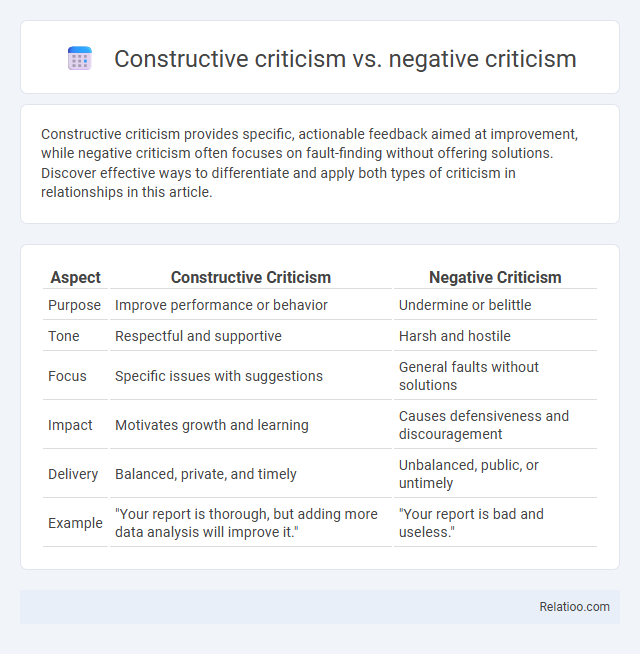Constructive criticism provides specific, actionable feedback aimed at improvement, while negative criticism often focuses on fault-finding without offering solutions. Discover effective ways to differentiate and apply both types of criticism in relationships in this article.
Table of Comparison
| Aspect | Constructive Criticism | Negative Criticism |
|---|---|---|
| Purpose | Improve performance or behavior | Undermine or belittle |
| Tone | Respectful and supportive | Harsh and hostile |
| Focus | Specific issues with suggestions | General faults without solutions |
| Impact | Motivates growth and learning | Causes defensiveness and discouragement |
| Delivery | Balanced, private, and timely | Unbalanced, public, or untimely |
| Example | "Your report is thorough, but adding more data analysis will improve it." | "Your report is bad and useless." |
Understanding Constructive Criticism
Understanding constructive criticism involves recognizing its purpose to provide actionable feedback that fosters improvement and personal growth. Unlike negative criticism, which often highlights faults without solutions, constructive criticism offers specific suggestions and encourages positive change. Emphasizing clarity, empathy, and practicality makes constructive criticism a valuable tool in professional and personal development.
Defining Negative Criticism
Negative criticism refers to feedback that highlights faults or mistakes without offering solutions or encouragement, often focusing on personal shortcomings rather than behaviors. Unlike constructive criticism, which aims to improve performance by providing actionable suggestions, negative criticism tends to demoralize and hinder motivation. Understanding this distinction is crucial for fostering effective communication and growth in personal and professional settings.
Key Differences Between Constructive and Negative Criticism
Constructive criticism provides specific, actionable feedback aimed at improving performance or behavior, while negative criticism often focuses on fault-finding without offering solutions. Your ability to distinguish between the two can enhance personal growth and professional development by embracing constructive feedback and avoiding discouragement from negative remarks. Understanding these key differences enables effective communication that fosters improvement and motivation.
The Purpose and Impact of Constructive Criticism
Constructive criticism aims to provide specific, actionable feedback that promotes growth and improvement, fostering a positive learning environment. Unlike negative criticism, which focuses on faults without guidance, constructive criticism encourages skill development and confidence building. Its impact enhances performance, motivation, and problem-solving abilities by highlighting strengths and identifying areas for improvement.
Harmful Effects of Negative Criticism
Negative criticism often leads to decreased self-esteem and motivation, hindering Your ability to improve and grow. Unlike constructive criticism, which provides actionable feedback aimed at development, negative criticism focuses on faults without offering solutions, causing frustration and anxiety. Repeated exposure to negative criticism can undermine mental health and reduce overall productivity in personal and professional environments.
Strategies for Delivering Constructive Criticism
Constructive criticism involves providing specific, actionable feedback that emphasizes improvement and growth, whereas negative criticism often focuses on faults without offering solutions, leading to defensiveness. Effective strategies for delivering constructive criticism include using clear examples, maintaining a respectful tone, and highlighting strengths alongside areas for development. By adopting these methods, your message promotes positive change and encourages receptiveness.
Recognizing and Responding to Negative Criticism
Recognizing negative criticism involves identifying comments that are unhelpful, vague, or aimed at undermining rather than improving performance. Your response should prioritize maintaining professionalism by addressing the specific points objectively, avoiding emotional reactions, and seeking clarification to determine if any constructive elements exist. Developing skills to filter negative criticism from constructive feedback enables growth and prevents discouragement in personal and professional settings.
Benefits of Constructive Feedback in Personal Growth
Constructive criticism offers actionable insights that promote self-awareness and skill development, fostering continuous personal growth. Unlike negative criticism, which can demotivate and create resistance, constructive feedback encourages a positive mindset and empowers individuals to make meaningful improvements. Embracing constructive criticism enhances emotional intelligence and resilience, driving long-term success and improved relationships.
Turning Negative Criticism into Positive Change
Negative criticism often focuses on faults without offering solutions, which can demotivate individuals and hinder growth. Constructive criticism, by contrast, provides specific, actionable feedback aimed at improvement, fostering a positive mindset and motivation. Turning negative criticism into positive change involves reframing feedback to identify opportunities for learning and setting clear steps for development, enhancing both personal and professional progress.
Fostering a Culture of Constructive Critique
Fostering a culture of constructive critique enhances your team's growth by emphasizing actionable feedback that supports improvement rather than solely pointing out flaws, as seen in negative criticism. Constructive criticism focuses on specific behaviors and solutions, promoting positive change and collaboration, while negative criticism often leads to defensiveness and stagnation. Encouraging an environment where feedback is perceived as helpful guidance cultivates trust and continuous development.

Infographic: Constructive criticism vs Negative criticism
 relatioo.com
relatioo.com